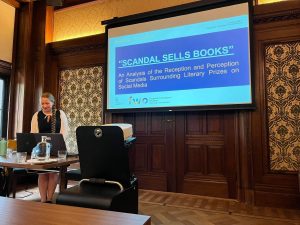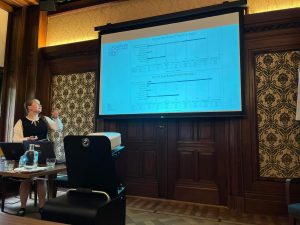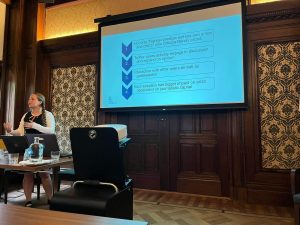 In July, I once again participated in the SHARP Conference (https://sharp2022.nl/) and this year’s focal point was the “power of the written word”. I presented a paper on scandals in the context of two literary prizes, namely the (Man) Booker Prize as well as the Not the Booker Prize and the reception of these scandals on Twitter. The title of this individual paper was “‘Scandal sells books’: An Analysis of the Reception and Perception of Scandals Surrounding Literary Prizes on Social Media.”
In July, I once again participated in the SHARP Conference (https://sharp2022.nl/) and this year’s focal point was the “power of the written word”. I presented a paper on scandals in the context of two literary prizes, namely the (Man) Booker Prize as well as the Not the Booker Prize and the reception of these scandals on Twitter. The title of this individual paper was “‘Scandal sells books’: An Analysis of the Reception and Perception of Scandals Surrounding Literary Prizes on Social Media.”
This paper was originally scheduled to be part of the panel “The public power of the book”, in which Henriët Graafland was to present her research as well. However, due to organisational challenges, the panels had to be split up. I was then invited to join the panel on “Literary Institutions”, which was chaired by Prof. Laura Dietz. This granted me the wonderful opportunity to present my research alongside Prof. Simone Murray and Lisa Gitelman, who discussed “How Literary Studies Came to Ignore Books: Choices in Institutionalising English” and “Citation and Mediation: A Reading of MLA Style” respectively.
Abstract: “Scandal sells books”: An Analysis of the Reception and Perception of Scandals Surrounding Literary Prizes on Social Media
Due to their role as traditional gatekeepers in the field of literary criticism, literary prizes are responsible for the institutionalised consecration of literary texts. They are increasingly topic of research (e.g Moser 2004, English 2005, Leinen 2010, Ducas 2013, Röhricht 2016, Sapiro 2016, Auguscik 2017, Childress et al. 2017, Kennedy-Karpat and Sandberg 2017, Rahmann 2017). The general discourse surrounding prizes, however, tends to be negative (cf. English 2005, p. 187) and they are frequently subject of scandals. Nevertheless, scandal is “the instrument par excellence of symbolic action” (Bourdieu p. 84) and English argues that “scandal […] is constitutive of prizes” (English 2002, p. 113). Scandal is consequently inherent to literary prizes.
In this presentation, I shall examine two scandals surrounding the Booker Prize and the Not the Booker Prize, respectively. The Booker Prize is no stranger to scandal, in fact its success relies on it (English 2002, p. 113) and Drabble states that the prize “has failed in its task of stimulating public interest” if it is not subjected to “bitter controversy and scandal” (p. 250). The case study in question is the 2013 scandal concerning the expanded nomination criteria, which allow any novel written in English and published in the UK or Ireland to qualify. Although its counter-prize is hardly as well-known and despite its goal to challenge the Booker Prize’s obscure nomination and judging practices, the Not the Booker has also known controversy. I shall take a closer look at the 2012 edition and the scandal pertaining to Ewan Morrison’s leaked e-mail, in which he lied about the competition and criticized the voting system, his refusal to withdraw, as well as the reactions of the organisers. Within this context, I thus aim to study the emerging and evolving figure of the layperson critic as an additional literary gatekeeper on social media platforms. For this, I will analyse the tweets that were created in the immediate wake of these scandals in order to gain insight into the content of the user-generated literary criticism created by new layperson gatekeepers regarding traditional gatekeepers.
Bibliography:
Auguscik, Anna. Prizing Debate: The Fourth Decade of the Booker Prize and the Contemporary Novel in the UK. Transcript, 2017.
Bourdieu, Pierre, and Hans Haacke. Free Exchange. Polity Press, 1995.
Childress, Clayton, et al. “Publishers, Authors, and Texts: The Process of Cultural Consecration in Prize Evaluation.” Poetics, vol. 60, Feb. 2017, pp. 48–61.
Drabble, Margaret. “Pleasure and Prestige. A Writer Reflects on the Prize System.” British Book News, April 1989, pp. 250-251.
Ducas, Sylvie. La littérature à quel(s) prix? Histoire des prix littéraires. La Découverte, 2013.
English, James F. “Winning the Culture Game: Prizes, Awards, and the Rules of Art.” New Literary History, vol. 33, no. 1, Johns Hopkins University Press, 2002, pp. 109–135.
English, James F. The Economy of Prestige: Prizes, Awards, and the Circulation of Cultural Value. Harvard University Press, 2009.
Kennedy-Karpat, Colleen, and Eric Sandberg. Adaptation, Awards Culture, and the Value of Prestige. Springer Berlin Heidelberg, 2017.
Leinen, Angela. Wie man den Bachmannpreis gewinnt. Gebrauchsanweisung zum Lesen und Schreiben. Heyne, 2010.
Moser, Doris. Der Ingeborg-Bachmann-Preis. Börse, Show, Event. Böhlau Verlag, 2004.
Pickford, Susan. “The Booker Prize and the Prix Goncourt. A Case Study of Award-Winning Novels in Translation.” Book History, vol. 14, 2011, pp. 221–240.
Rahmann, Kathrin. Von der Wirkung zur Wertung. Formal-ästhetische Werte in den Diskussionen des Ingeborg-Bachmann-Wettbewerbs 1999-2009. 2017. Georg-August-Universität Göttingen, PhD dissertation.
Röhricht, Karin. Wettlesen um den Ingeborg-Bachmann-Preis. Korpusanalyse der Anthologie Klagenfurter Texte (1977-2011). Studienverlag, 2016.
Sapiro, Gisèle. “The Metamorphosis of Modes of Consecration in the Literary Field: Academies, Literary Prizes, Festivals.” Poetics, vol. 59, Dec. 2016, pp. 5–19.

